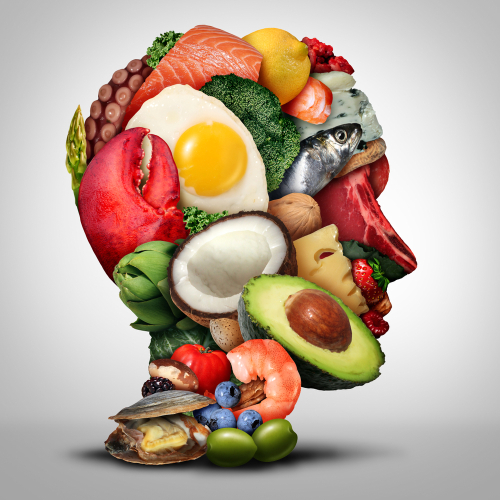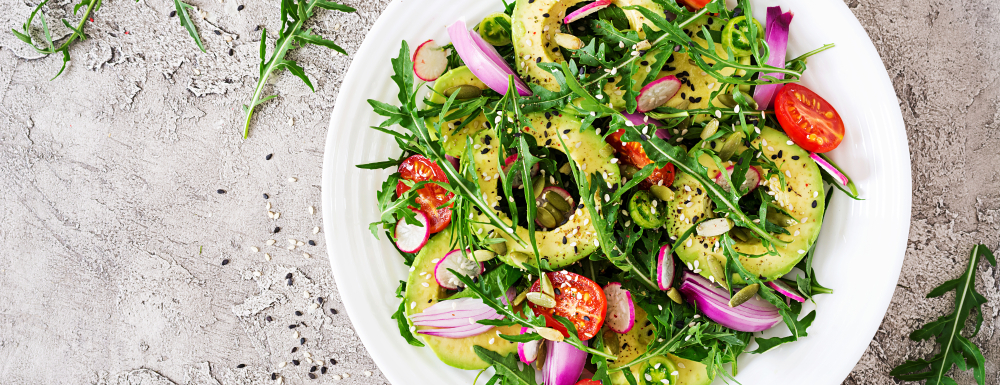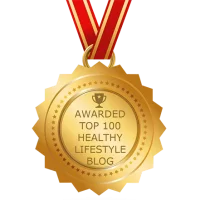Keto or vegan? What we put into our body is important. Our diet not only determines whether we face many health concerns in our lifetime, but also acts as a functional medicine. It can be tricky to navigate what plan best suits our unique needs though. Here’s a look at two of the most popular and medically researched diet plans used today; the ketogenic (keto) and vegan diets.
Kick The Carbs With Keto
Are you ok with kicking out the carbs? With the keto diet, carbs are capped off at no more than 50 grams per day. Sugar, including starchy foods such as bread, cereals, rice, pasta, potatoes, and corn are avoided. Carbs from fruits are also off limits.
Carbs are replaced with high fat foods such as eggs, avocados, cheese, meats, and seafood taking up most of the plate. A typical keto diet consists of about 75% fat (around three times more than a traditional diet), a moderate amount of protein (about 20%) and very few carbs at only 5% instead of the 45-65% in most diets.
On a typical day as a “ketotarian,” you may have eggs and bacon for breakfast, a green salad with salmon and plenty of seeds for lunch, and steak for dinner. Keto is a carnivore’s dream. Looking for a keto-friendly snack? Grab a handful of almonds or a cheese plate (sans cracker).
The Science Behind Keto

Carbohydrates are the principal fuel source for the body. When we consume more carbohydrates than we expend, remaining carbs are broken down into glucose. Unused glucose is converted into glycogen and stored in the liver and muscles. When we don’t have enough carbs to meet our energy needs, the body turns to its glycogen stores. When these are depleted, the body switches to fat burning through a metabolic process known as ketosis.
Keto For Weight Loss
Weight loss is the most common reason people decide to try a keto diet. As well as burning fat for fuel, a diet high in fat tends to keep people feeling fuller longer and subsequently eating less. Another perk to eating keto is its sugar stabilizing qualities. Diets consisting of very few carbs have shown to lower blood glucose levels since it significantly improves hemoglobin. This dietary option also has the potential to replace medications used to treat Type 2 diabetes.
Keto Diet and Inflammation
More positive news comes from a Johns Hopkins study which showed the ketogenic diet having positive effects on neuroinflammation and oxidative stress. Today, the diet is successfully used as a therapy to treat neurological disorders including migraines, Alzheimer’s and epilepsy.
But isn’t all that fat bad for the heart? Maybe not as much as we think. Research, included in a 2004 study not only reported significant weight loss using the ketogenic diet but also an increase in good HDL cholesterol, as well as a decrease in triglycerides and bad LDL cholesterol, surprisingly decreasing the effects and risk factors of cardiovascular disease.
Is A Plant-Based Diet For For You?

On the polar opposite side of the diet theory spectrum, the vegan or plant-based diet is centered around carb rich fruits, vegetables, and grains. Animal products are forbidden; taking meats, eggs, fish and dairy products literally off the table. Vegan diets are full of phytochemical rich plants, which have shown to prevent oxidative stress that can damage cells. Plant-based diet is on the rise, with more and more people choosing it every year for environmental and/or health reasons. In response to the growing demand, many brands have created plant-based alternatives to the omnivore staples, such as milk, cheese and even meat. While early vegans were limited to tofu-based products for their source of protein, today’s plant-based consumer has access to an array of flavorful choices from national brands. Today, you can easily find nut-based milk alternatives at coffee shops, vegan cheese for your favorite pizza, or a plant-based burger option at a mainstream restaurant. Switching to a plant-based diet is easier than ever.
Vegan Diet and Weight Loss
One of the first physical changes people see after going vegan is weight loss. This is because there are typically fewer calories than in most diets. A 2015 study published by the Proceedings of National Academy of Sciences displayed other major health benefits to the vegan diet as well. Reduced risk of coronary heart disease, stroke, cancer, and type 2 diabetes were recorded.
Who Can Benefit From A Plant-Based Diet?
Research shows people on diets with more fruits and vegetables are less likely to develop metabolic syndrome. A syndrome where clusters of conditions such as heart and blood disease, and Type 2 diabetes occur together. Obese and senior adults may especially benefit from a vegan diet, as the risk of metabolic syndrome increases with weight and age.
Vegan Diet and Kidney Disease
Another perk to eating a plant-based diet is that it can help prevent kidney disease! Skipping meat can avoid the building of acids that damage cell walls and exacerbate the disease. The natural compound Phytate is an additional protector. This is found in plant foods like grains, nuts and seeds. The acidic compound binds to excess phosphorus that can cause damage to blood vessels and bones.
Mostly plentiful, there are a few nutrients known to be lacking in typical Vegan diets. According to Oxford Academic, the vegan diet could lead to some nutrient deficiencies. Getting enough Vitamin D, B-12, Zinc and iron could prove difficult without supplements. Fortified vegan foods, such as soy milk and tofu, are a common solution for getting the recommended micro-nutrients.
Is Keto Or Vegan Diet Better For Your Health?
While quite different, both nutritional plans are well known for their significant benefits. Scheduling an appointment with your health care provider can help point out any health concerns you may be facing and assist in your decision. Dr. Thaik’s practice offers comprehensive blood tests to determine food allergies and sensitivities. You can receive a personalized food profile and use it to decide on the best diet for you.





